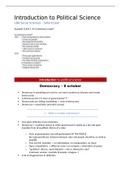Summary
Introduction to Political Science: Summary + elaboration of examples and quotes
- Course
- Institution
All the summaries of the course: introduction to political science + elaboration of the examples given in class. Also a discussion of quotes & their adherent political ideologies.
[Show more]



